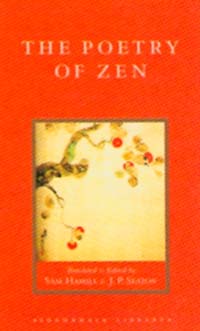The Poetry of Zen
Sam Hamill and J. P. Seaton
Boston: Shambhala Publications, 2004.
208 pp.; $16.95 (cloth)
What is it about poetry and Zen? The essence of Zen is meditation, solitary sitting. Zen resides outside the intellect and beyond words. Yet poetry and Zen seem inextricably joined, with many of our most illustrious teachers choosing to express themselves in verse. Poetry is often used both as a means to describe Zen practice and as an aid to the practice itself. The writer and translator Gary Gach collected numerous modern examples in his 1998 compilation What Book!?(Parallax Press), showing that this tradition of Zen-in-verse is alive and well today, extending to modern poet-teachers like Philip Whalen and Norman Fischer. And poetry has been part of Zen from the start: The Platform Sutra, that classic legend of Zen Buddhism, is essentially the story of two competing poems.
In their engaging new anthology, The Poetry of Zen, Sam Hamill and J.P. Seaton have collected and translated over two hundred poems from China and Japan, spanning more than two millennia. Purists will note that this places the earliest poems long before the traditional dawn of Zen, marked by the arrival of China’s first Ch’an (Zen) patriarch, Bodhidharma, in the sixth century. But this is no mistake; a defining premise of the collection is that Zen is rooted firmly in the Taoist tradition that preceded it. The first Buddhists in China were often schooled in Taoist philosophy, and earl y translators would use Taoist terms to express Buddhist terminology, grounding the new faith in the old. “Zen is Taoist Buddhism,” the editors explain in one of two far-reaching introductions, or put another way, “Zen is Buddhist Taoism.”
This somewhat unorthodox stance creates an eclectic mix of poetry, beginning with fresh translations of several parts of Lao Tzu’s Tao Te Ching (thought to originate in the fourth or third centuries B.C.E.) and ending with a beautiful selection of haiku by the beloved Japanese poet Kobayashi Issa, who died in the nineteenth century. Many of these embody the typically irreverent spirit often associated with Zen masters through the ages, as in this untitled poem attributed to the sixth-century poet Wang Fan-Chih, which pokes fun at our natural egoism:
When the rich pass proudly by
on big, smooth horses,
I feel foolish
riding my scrawny donkey.
I feel much better
when we overtake a bundle of sticks
riding a bony man.
Others works are more poignant, such as this one by Basho, Japan’s celebrated seventeenth-century haiku master:
Nothing in the cry
of cicadas suggests they
are about to die
This book is not intended as an academic survey, although the introductions (one on Chinese poetry, the other on Japanese), as well as brief biographical notes on each poet, will be helpful to readers new to the material. Infused throughout the collection is the notion that poetry can be much more than a distraction from spiritual practice, and that reading it should not be merely a literary exercise. This is as much poetry frtr Zen as poetry of Zen. As Hamill puts it in the book’s preface:
Poetry often says what cannot be said in prose….A good poem says more than the sum of its words, leading the reader into the practice of understanding the great unsaid that is contained, framed in a poem’s rhythms, words, and silences….All this makes poetry an excellent aid to practice.
Has anyone ever been enlightened by a piece of writing? The editors admit that “there are probably tens of thousands of readers of Zen books for everyone who has experienced Zen.” Yet we are surrounded by more and more of these Zen books, from earnest manuals on how to meditate to stories and novels attempting a fictional rendering of our suffering and delusion. Poetry, however, strives for something more. Great poems, like many of those collected here, seem to transcend language, to attempt a depiction of an absolute reality beyond our everyday minds. As the poet Jane Hirshfield has written, “Poetry’s work is the clarification and magnification of being.” Consider this eighth-century verse, most likely by a monk writing under the name of Shih Te:
My poems are poems;
some people call them sermons.
Well, poems and sermons share one thing:
when you read them, you’ve got to be careful.
Keep at it. Get into detail.
Don’t just claim they’re easy.
If you were to live your life like that,
a lot of funny things might happen.
The Poetry of Zen is even more about Zen than it is about poetry. To paraphrase a verse by Li Po, China’s illustrious eighth-century poet, these words live in the other world, one that lies beyond the human. While not every verse will appeal to every reader, there is much here on which to linger and reflect. This is a book to enrich our life and our practice, a collection that encourages us to be mindful, to keep at it. Read it, and sit.
Thank you for subscribing to Tricycle! As a nonprofit, we depend on readers like you to keep Buddhist teachings and practices widely available.